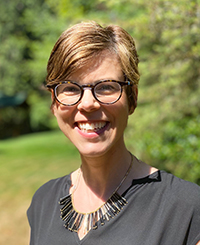Patient Story: Jennifer Simon
June 04, 2021

Jennifer Simon, 47, has always paid attention to her health. Her identical twin sister, Jill, is a physician and regular checkups have always been a part of Jennifer’s life. But in the fall of 2018, she was several months late for her annual mammogram. Jennifer wasn’t too concerned about it because all her prior tests had been clear.
She had a screening mammogram, which showed new calcification in the left breast. She then had a diagnostic mammogram for further evaluation. After additional imaging, a biopsy was recommended as calcifications can indicate breast cancer. Jennifer subsequently underwent a surgical biopsy as she was not a candidate for image-guided core biopsy.
Jennifer says she was determined not to worry about the biopsy. She had the procedure at Overlake, and the next day she was back to work teaching advanced placement calculus. She soon learned that the biopsy revealed “atypical hyperplasia.”
Atypical hyperplasia is a precancerous condition where abnormal cells are found in the breast duct or lobules. Although benign, the risk of breast cancer is four to five times higher for women with this condition.
Jennifer explored her options with Overlake breast surgeon April Phantana-angkool, MD, who recommended high-risk screening and to consider going on certain medications that can decrease the risk of developing breast cancer. The screening includes a clinical examination every six to 12 months, and alternating an annual screening mammogram and breast MRI every six months. Since her diagnosis, Jennifer has been under close surveillance at Overlake.
“I’m so glad that we decided on that,” says Jennifer. “I feel that I’m getting the best care, and I never leave Dr. Phantana’s office without an appointment for my next visit or anything else I might need.”
Because Jennifer had a family history significant for breast cancer, she underwent genetic testing at Overlake. The tests didn’t place her at a higher risk for breast cancer, but they did find a genetic predisposition for cancer of the colon. Jennifer was advised to get a colonoscopy, which found she had a benign polyp—something that could turn cancerous if untreated. The polyp was safely removed, and Jennifer will receive a colonoscopy every three years in addition to being closely followed by Dr. Phantana-angkool for breast cancer.
Jennifer is married with two teenage sons and says that by going to Overlake, “I can get excellent care close to home. Less travel time means more time with my family. I don’t know why I would go anywhere else.”








